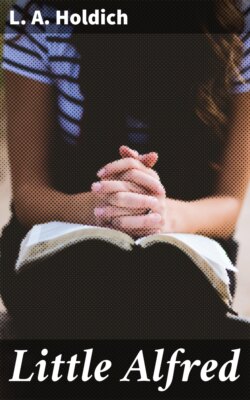Читать книгу Little Alfred - L. A. Holdich - Страница 5
На сайте Литреса книга снята с продажи.
CHAPTER II
A CONTRAST TO THE FORMER CHAPTER.
ОглавлениеTable of Contents
* * * * * little children, endeavoring
to gather amusement from the very dust, and
straws and pebbles of squalid alleys, shut out
from the glorious countenance of nature.
William Howitt.
When little Alfred returned home, on a Saturday afternoon, from one of the delightful visits to the woods of which I have told you, his mamma lifted him up on the sofa beside her, and said,
“How good our heavenly Father is to my little Alfred! He has given him a kind papa, who loves him dearly. Little boys cannot be thankful enough to God for that great blessing. There are many little children who have very unkind fathers. Some of them are wicked enough to spend all their money for rum, and do not get anything for their poor little children to eat.”
Alfred’s little sister Flora had run up to her mamma, to listen to her as she talked with Alfred. She was a tender-hearted little girl, and her lip quivered, and the tears came into her eyes, when she heard about the children who had such naughty fathers.
Then Mrs. Penrose took little Flora upon her lap, and went on talking to Alfred. She said,
“And my little Alfred’s papa takes him in the pleasant woods, and in the fields, and lets him gather the sweet flowers which grow there. And he and little Flora can hear the happy birds sing all day long. Now, there are some little children who never see a flower grow, or hear a bird sing, and they scarcely even see the pretty blue sky which is over their heads.”
“O, mamma!” said Alfred, “are they blind and deaf?”
“No, my love, but they live in dark and crowded places in the city. Some live in garrets, and some in cellars, where the houses are high and the streets very narrow. So the beautiful things which God has given us to make us glad are quite shut out from them. When I lived in the city I went one day to see a poor family who lived in a cellar, in a dark and dirty court. The father of this family was a drunkard. He had even sold, for rum, the bed on which his sick wife lay. When I went to her, the poor woman had only some straw, in a corner of the cellar, to lie upon. The children had very little fire, although the weather was cold, and nothing to eat, except what people carried them from day to day.
“Among the children was one pale, sickly-looking little boy, named Johnny. He was only eight years old; but his mother told me that she did not know what she should have done without little Johnny. He did everything that he could for her during the day; and when she coughed or moved at night, the little boy would run up to her and ask her if she would have some water, or if he should raise her head higher.
“In a corner, Johnny had a faded rose planted in some dirt which he had scooped from the cellar, and put in an old tin cup.
“The rose had been, one day, dropped by a lady, who was walking before Johnny, in Broadway. Johnny was an honest boy. He ran up to the lady, and offered her the rose which she had dropped. The lady smiled, and said, ‘You can keep it, my little boy. I do not want it.’
“The rose was then fresh and beautiful. Johnny thought that if he planted it, it might perhaps live. It did take root even in that poor soil, but it could not grow any.
“He looked up into my face, on the day that I first went to see his mother, and said,
“‘O, ma’am! do you think that my rose will live? I have kept it in the warmest place, and watered it every day.’
“‘Yes,’ said his mother, ‘however hungry and cold poor Johnny has been, he never forgot his rose.’
“I saw when he asked me the question that his rose was nearly dead. The tears came into his eyes when I told him this.
“Poor little boy! The flower was like himself, withering away for want of light and air.
“Just think, Alfred, how happy little Johnny would have been, running with his bare feet through the fields, looking at the golden and speckled butterflies, filling his cap with wild-flowers, and listening to the song of the birds, and the busy hum of the honey-bee!
“One day I took Johnny to my house, and showed him a stand of flowers. He was delighted. He clapped his hands, and his eyes sparkled. He smelt the heliotropes and the roses, and he looked at the rich flowers of the cactus. When I gave him a bouquet to carry to his own miserable home, he seemed perfectly happy.
“The next time I went to that dark, gloomy cellar, there the flowers stood in the old tin cup from which the poor rose had been taken.”
Alfred and Flora felt sorry for poor Johnny; but they were glad to hear that his mother got well, and that little Johnny had been put with a farmer, where he could hear the birds sing, and see the brooks and the trees, and pick wild-flowers in the fields.
When they went to bed they thanked God for many mercies which they had not thought of before.
